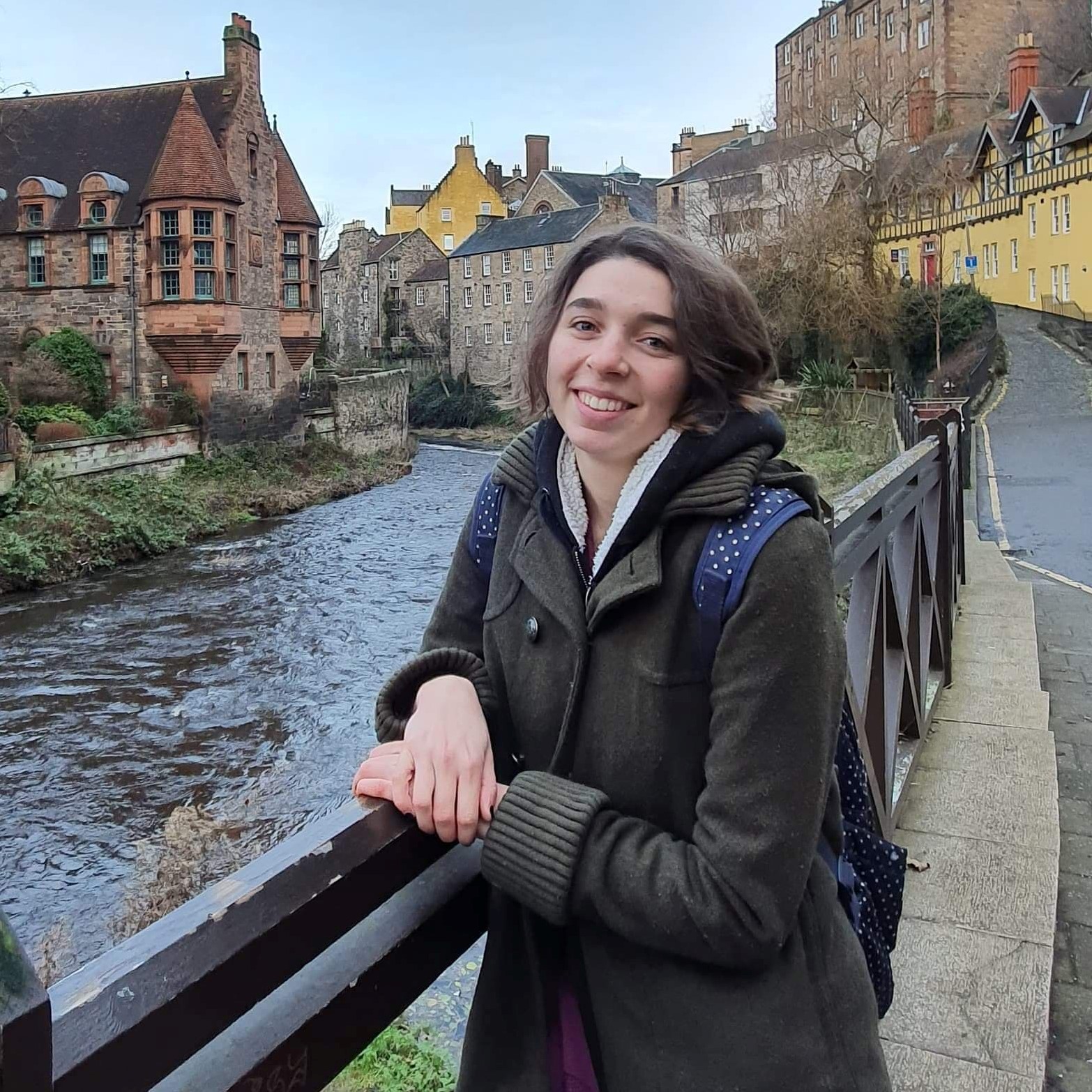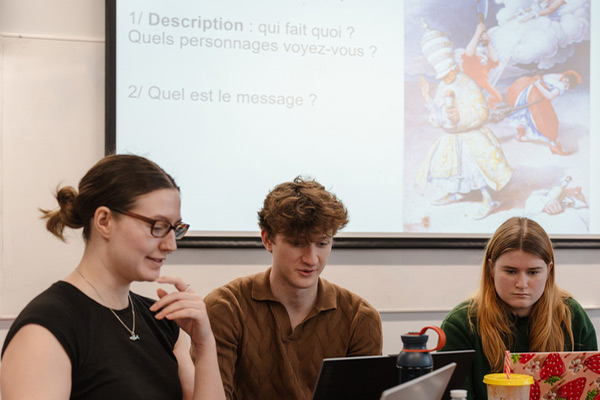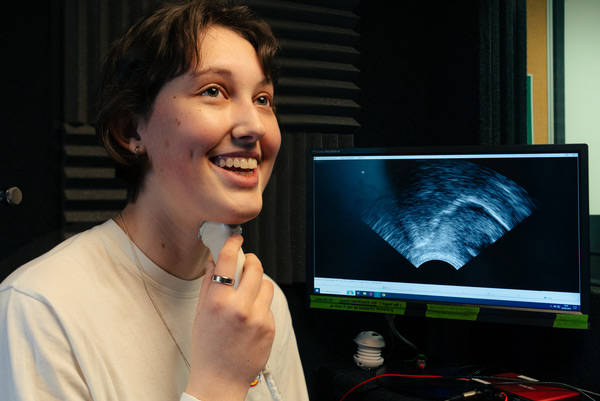View semester dates

BA (Hons) French and Linguistics (with a year abroad)
Combine a modern language with the study of linguistics. Develop complementary skills across the disciplines.
Year of entry: 2026/27
View semester dates
8th in the UK for linguistics
9th in the UK and world top 100
1st in the Russell Group for 'learning resources'
4th in the UK for French
4th in the UK for French
Why study French and linguistics at York?
Develop your modern language proficiency. You'll be taught in the language you’re learning, with a focus on society, politics and culture. Guided by our supportive staff, many of whom are native speakers, you’ll rapidly develop your fluency and knowledge. If you choose a language as a beginner (ab initio), you’ll be amazed at how you progress.
Learn the science behind how we communicate. In linguistics, you’ll engage with language on a conceptual level and analyse linguistic data. You’ll have options to explore syntax, semantics, phonetics, phonology, sociolinguistics and more, with academics who are leading researchers with a genuine passion for their subjects.
Explore specialist labs and facilities. Depending on the modules you choose, you’ll learn in dedicated spaces, including our e-lab. We’re also home to a premium multilingual interpreting and translation suite.
Enhance your experience with a year abroad. You’ll study at one of our partner universities, or take a work placement or internship. Your plans will be supported by our year abroad coordinators. If you prefer not to go abroad, we offer a 3-year Linguistics with French degree.

In French this year we have around 40 students. It creates a real sense of community and everyone knows everyone else, making group work much more enjoyable.
Course content
During your degree, you'll study modules in French languages, cultures, and linguistics, and may have the option to study elective modules from our wide range of language programmes.
Your language modules will explore the rich society and cultures of French-speaking countries, and you'll be taught almost exclusively in French. These modules will develop the transcultural and linguistic knowledge you'll need to become a high-level communicator. You'll engage with languages and cultures from a transnational view, allowing a deeper reflection on the values and attitudes of different cultural identities and backgrounds.
Your linguistics modules will help you understand the nature of language itself: how it is structured, how it has evolved, and how we use and understand it within our society. These modules will enable you to think critically and approach your studies from an analytical point of view.
In your second and final years, you can tailor your degree to your interests. In the final year, you can choose from a range of advanced French modules designed to consolidate your critical skills through in-depth research and analysis. Many final-year linguistics modules offer you the opportunity to focus on French languages as the topic of research.
You’ll go abroad in your third year. You can choose a work placement, internship or studying at one of our partner universities. Our internship students have been to a wide range of areas including education, the heritage sector, NGOs, media and journalism, translation, marketing and finance around the world. Your plans will be supported by our departmental year abroad coordinators.
Year 1
- If you have studied French to A level, you'll take the post-A level route.
- If you are taking French ab initio (from scratch), you'll take the ab initio route.
Core modules
Post-A level core modules:
- French Language and Cultures: Upper Intermediate
- Language and the Mind
- Understanding Language in the Real World
- Understanding French-speaking Cultures and Societies (post A-level)
Ab initio core modules:
- Intensive French Language and Cultures: Beginner
- Language and the Mind
- Understanding Language in the Real World
- Understanding French-speaking Cultures and Societies (ab initio route)
Option modules
You will study two option modules. Examples can be found below. Some option module combinations may not be possible. The options available to you will be confirmed after you begin your course.
Academic integrity module
In addition to the above you will also need to complete our online Academic Integrity module.
Year 2
Core modules
Option modules
You will study at least one language option module. Examples may include:
- World Cinemas: Representing National and Transnational Societies and Cultures
- Laicité: religious freedom or state repression?
You'll also continue to deepen your theoretical knowledge in the core areas of linguistics that you choose to pursue. Second-year linguistics modules cover areas including phonetics and phonology, language variation and change, syntax, semantics, interaction, and psycholinguistics. In previous years, options have included:
- Aspects of a Theory of Syntax
- Acoustic Phonetics and Phonological Analysis
- Sociolinguistics
- Teaching English as a Foreign Language I
- Plurilingualism, Multilingualism and Transnational Languages: Concepts, Strategies and Approaches
The options available to you will be confirmed later in the year. For further information please get in touch.
Year 3
In your third year, you’ll go abroad for a year. You can choose to study at another university or complete a work placement/internship. You may also be able to complete a British Council English Language Assistantship. The year abroad is assessed on a pass/fail basis by the University of York.
Immersing yourself in the language and culture of another country will enable you to become fluent in the language, both orally and written. The skills you gain will prepare you for both your final year of study and your future career.
Elective modules
You may be able to replace one option module with an elective module, studying a complementary subject, a language or an interdisciplinary topic.
Year 4
Core modules
Your final year core module in French is designed to consolidate your critical skills through in-depth research and analysis. By this stage in your degree, you'll be able to demonstrate oral and written fluency, as well as accurate language use in its social and cultural contexts.
Option modules
You will study five option modules, with at least one option being a French module. Examples can be found below. Some option module combinations may not be possible. The options available to you will be confirmed after you begin your course.
French modules:
- World Cinemas: Representing National and Transnational Societies and Cultures
- Myths, Memories and the Legacy of the French Occupation (1940-44)
- Independent Study in Languages and Cultures
Linguistics modules:
- Advanced Topics in Phonetics and Phonology
- Bilingualism
- Multimodality: Language and the Body
- Psycholinguistics: Language Processing
- Advanced Topics in Psycholinguistics: Language Processing
- Neurolinguistics: Language and the Brain
- Crosslinguistic Semantics
- A Usage-based View of Language
- English Place-names across Time and Space
- Teaching English as a Foreign Language II
- Translation into English: Methodology and Practice
The options available to you will be confirmed later in the year. For further information please get in touch.
Our modules may change to reflect the latest academic thinking and expertise of our staff, and in line with Department/School academic planning.
Learning outcomes
Every course at York has been designed to provide clear and ambitious learning outcomes. These learning outcomes give you an understanding of what you will be able to do at the end of the course. We develop each course by designing modules that grow your abilities towards the learning outcomes and help you to explain what you can offer to employers. Find out more about our approach to teaching and learning.
Learning outcomes for this course
- Understand key aspects of linguistic phenomena and patterns, as well as of the societies and cultures of the studied languages based on critical evaluation of key positions, perspectives and data. (Language expert)
- Select and deploy appropriate qualitative and quantitative research methods acquired through the study of the nature, use, and acquisition of language to gain a holistic and multifaceted understanding of a range of issues in the cognitive and social sciences. (Knowledgeable researcher)
- Apply creatively and critically your understanding of languages and cultures in their transnational context in order to help negotiate and solve problems arising from social, cultural and linguistic diversity. (Creative problem solver)
- Communicate effectively using the full range of your language resources to provide evidenced, structured and well-supported information on linguistic questions and controversies to mono- as well as multilingual audiences. (Multilingual communicator)
- Mediate concepts and texts in a range of settings using your full repertoire of languages to facilitate the achievement of collective aims in trans- and intercultural contexts (Effective mediator)
- Design, manage, and contribute efficiently and effectively to individual and collaborative projects using your knowledge and expertise, as well as leadership and negotiation skills. (Resourceful team worker)
- Develop your expertise in the languages, cultures and societies as well as your language repertoire by recording, reflecting upon and evaluating your practices and identifying appropriate resources for your personal and professional learning needs. (Reflective practitioner).
- Engage with confidence in multilingual and transcultural encounters based on your acquired awareness of, and sensitivity to, the relativity of social, cultural and linguistic norms. (Transcultural agent)
York, Oxford, Cambridge, Imperial
Just four UK universities are rated Gold for teaching and top ten for research* in the latest national assessment exercises.
* Awarded joint 10th in the Times Higher Education ranking of the Research Excellence Framework 2021.
Teaching and assessment
You’ll study and learn with academics who are active researchers, experts in their field and have a passion for their subjects. Our approach to teaching will provide you with the knowledge, opportunities, and support you need to grow and succeed in a global workplace. Find out more about our approach to teaching and learning.
Teaching format
We offer you extra study support in several ways. Our Peer Assisted Learning programme gives you the opportunity to work with other students.
Languages
Our focus at York is on effective communication in French, as we integrate the teaching and learning of content and language. That is why:
- we are unique in teaching our core modules in their language of study
- we teach mainly in small seminars
- we emphasise issues of cultures and society, allowing you to develop a high level of transcultural awareness to underpin your language skills
- many of our staff are native-speakers of the languages we teach
Linguistics
Core linguistics modules are taught through lectures, accompanied by sessions in smaller groups. With more advanced linguistics modules, you'll have interactive classroom activities, such as group presentations or practical sessions, in addition to lectures. In final-year linguistics modules, most teaching is in smaller groups.
Contact hours
In the first year of your degree, you will typically have between 9 and 11 hours of contact time per week per semester. You will spend 3 to 4 hours in lectures, and 6 to 7 hours in seminars or workshops.
Contact hours in the second and final year can vary depending on individual module choices.
Timetabled activities
In your first year, you can expect:
| Lectures | 4 hours per week |
|---|---|
| Seminars | 8 hours per week |
| Workshops | 4 hours per week |
These figures are representative of a typical week. Your contact hours will vary throughout the year due to your module choices, non-compulsory classes, exam periods and changes to scheduled activities.
Outside your timetabled hours, you'll study independently. This may include preparation for classes, follow-up work, wider reading, practice completion of assessment tasks, or revision.
In the UK, full-time students are expected to spend 1,200 hours a year learning. That's about 40 hours of classes and independent study each week during semesters. Everyone learns at a different rate, so the number of hours you spend on independent study will be different to other students on your course.
Facilities
We have our own e-Lab for teaching. Here, you'll have access to a variety of resources, including specialist linguistics software and online language-learning materials.
Teaching location
You will be based in the Language and Linguistic Science buildings on Campus West.
About our campus
Our beautiful green campus offers a student-friendly setting in which to live and study, within easy reach of the action in the city centre. It's easy to get around - everything is within walking or pedalling distance, or you can use the fast and frequent bus service. Take a campus tour.
Assessment and feedback
You'll be assessed in a variety of ways, including essays, projects, presentations, and written and oral exams. Assessments include formative work which will help you practise or develop skills, but will not count towards your final degree mark.
Instructors provide you with feedback in a variety of forms, for example: written feedback including annotations of your work, in-class discussion of common problems, model answers, one-on-one discussion of projects, or responses and comments to work submitted online.
Your year abroad is assessed. All students must complete two assessments in their language of study. If you are studying at a university, you must attend courses and sit the exams. If you are on a work or teaching placement, you must satisfactorily complete the duties set out in the placement agreement. However, your marks on the year abroad assessments do not contribute towards your overall degree mark.
Disability information
We can make reasonable adjustments to assessment procedures for students with disabilities. However, if you have dyslexia please note that it is not possible to make adjustments in the marking of work written in a closed language exam. This is because accurate spelling is one of the assessment objectives for language exams. Closed exams make up only a proportion of the assessment types used for languages. There are other assessment types such as coursework and oral presentations which are also used. As a student with dyslexia you could apply for extra time in closed exams, if this would be of assistance. See the University's disability support pages for further details.
Fees and funding
The fees and funding information here is for students starting in the 2026/27 academic year.
If you take a year abroad or year in industry you'll pay a reduced rate of fees for that year.
Annual tuition fees
| UK (home) | International and EU |
|---|---|
| £9,535 (TBC) | £26,900 |
The UK government has announced its intention to increase tuition fees from £9,535 to £9,790 for the 2026/27 academic year. We expect this to apply to new UK (home) undergraduate students starting their studies in September 2026.
UK (home) or international fees?
The level of fee that you will be asked to pay depends on whether you're classed as a UK (home) or international student. Check your fee status.
Fees for subsequent years
- UK (home) fees may increase within the government fee cap in subsequent academic years. We will notify you of any increase as soon as we can.
- International fees are subject to increase in subsequent years in line with the prevailing Consumer Price Index (CPI) inflation rate (up to a maximum of 10%).
More information
For more information about tuition fees, any reduced fees for study abroad and work placement years, scholarships, tuition fee loans, maintenance loans and living costs see undergraduate fees and funding.
Additional costs
Set texts are available from the Library or online, but you may wish to buy your own copy for some modules. These typically cost between £10 and £30. For ab-initio languages you may need to buy books with a total cost of £50 to £60. Second hand books are often available more cheaply.
Funding
We'll confirm more funding opportunities for students joining us in 2026/27 throughout the year.
- UK government loans
- UK scholarships and bursaries
- International scholarships
- Country-specific funding
- US loans
Departmental funding
Find out more about funding specific to Languages and Linguistics.

You can get involved in volunteering, with the Linguistics Society, which involves running events for other students, or with an external company that works with people who need speech and language therapy-based support, for example.
Careers and skills
The study of languages and linguistics at York equips you with effective communication, critical thinking and project management skills, which translate readily into any work context. This will help you to pursue careers in a range of fields. We'll enable you to become a highly sought-after graduate.
Hear from our students and graduates.
Career opportunities
- Marketing and communications
- Publishing
- Broadcasting and journalism
- Local government and public service
- Business, finance and accountancy
- Teaching
- Translation and interpreting
- IT and software development
- Social work and justice
Transferable skills
- Effective communication skills
- Intercultural awareness
- Critical thinking
- Project management
- Independent learning
- Data analysis
- Problem-solving
- Teamwork
- Ability to work with a variety of media and sources
Entry requirements
| Qualification | Typical offer |
|---|---|
| A levels | AAB |
| Access to Higher Education Diploma | Obtain Access to HE Diploma with 36 credits at Distinction and 9 credits at Merit or higher. |
| BTEC National Extended Diploma | DDD |
| European Baccalaureate | 80% overall average |
| International Baccalaureate | 35 points |
| T levels | Distinction overall including grade A in the Core T Level subjects in Accounting; Design and Development for Engineering and Manufacturing; Design, Surveying and Planning for Construction; Digital Business Services; Digital Production, Design and Development; Digital Support and Services; Engineering, Manufacturing, Processing and Control; Finance; Health; Healthcare Science; Legal Services; Maintenance, Installation and Repair for Engineering and Manufacturing; Management and Administration; Marketing; Science |
| Scottish Highers / Advanced Highers | Scottish Highers - AABBB Advanced Highers - not required for entry We may also be able to consider three Advanced Highers or a combination of Highers and Advanced Highers, where an applicant does not meet the grade requirement through Highers alone. Please contact us to discuss your qualifications. |
| International foundation programme | Foundation Certificate from our International Pathway College or an appropriate alternative. |
| Other international qualifications | Equivalent qualifications from your country |
Additional requirements
Ab initio or post-A level routes
You can take the language part of this programme ab initio (from scratch, or with a qualification at AS level or below), or you can study on a route designed for those who have an A level in this language.
Our language programmes are designed to develop fluency. For this reason we do not normally offer places to native or near-native speakers who wish to study their own language.
Alternative offers
Meeting the following additional criteria may qualify you for an alternative offer.
| Criteria | Adjustment |
|---|---|
| Widening participation | BBC This is conditional upon successful completion of the WP programme including the YorJourney module (Black Access Programme, Next Step York) or successful completion of Realising Opportunities More about widening participation. |
| Contextual offer | BBB |
| EPQ | If you achieve C or higher in the EPQ, you may be eligible for an alternative offer up to one A level grade (or equivalent) below our typical offer. |
| Core Maths | If you achieve B or higher in Core Maths, you may be eligible for an alternative offer up to one A level grade (or equivalent) below our typical offer. |
| MOOCs | If you successfully complete our online course Accents, attitudes and identity, you may be eligible for an alternative offer up to one A level grade (or equivalent) below our typical offer. Details about how to evidence completion of the MOOC will be sent in your offer letter. Please note: you do not need to pay for the certificate. More about MOOCs. |
English language
If English isn't your first language you may need to provide evidence of your English language ability. We accept the following qualifications:
| Qualification | Minimum requirement |
|---|---|
| IELTS (Academic) | 6.5, with a minimum of 6.0 in each component |
| IB English | A score of 4 in English A or 5 in English B (Higher Level or Standard Level) |
| Cambridge CEFR | 176, with a minimum of 169 in each component |
| Oxford ELLT | 7, with a minimum of 6 in each component |
| Oxford Test of English Advanced | 136, with a minimum of 126 in each component |
| Duolingo | Integrated subscores: 120 overall, with a minimum of 105 in each component |
| GCSE/IGCSE/O level English Language (as a first or second language) | Grade C / Grade 4 |
| LanguageCert SELT | B2 Communicator High Pass with a minimum score of 33/50 in each component |
| LanguageCert Academic | B2 with a minimum score of 33/50 in each component |
| Kaplan Test of English Language | 478 Main Flight score with 444 in each component |
| Skills for English | B2: Merit overall, with Pass with Merit in each component |
| PTE Academic | 61, with a minimum of 55 in each component |
| TOEFL | 87 overall, with a minimum of 21 in each component (taken before January 2026) 4.5 with 5 in Listening and 4.5 in each other component (taken after January 2026) |
| Trinity ISE III | Merit in all components |
| Other English language qualifications | We also accept other English Language qualifications, including various school-leaving certificates. |
For more information see our undergraduate English language requirements.
If you haven't met our English language requirements
You may be eligible for one of our pre-sessional English language courses. These courses will provide you with the level of English needed to meet the conditions of your offer.
The length of course you need to take depends on your current English language test scores and how much you need to improve to reach our English language requirements.
After you've accepted your offer to study at York, we'll confirm which pre-sessional course you should apply to via You@York.
Next steps
Contact us
Get in touch if you have any questions
Discover York








